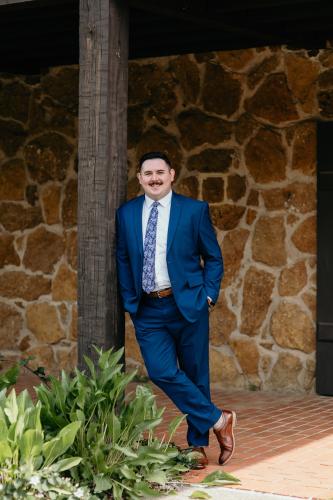NACOGDOCHES, Texas — Stephen F. Austin State University’s Jordan Coleman, a Master of Arts in public history student from Effingham, Illinois, has been named a Jess Hay Graduate Fellow by The University of Texas System for the 2024-25 academic year.
The fellowship is a unique graduate opportunity established by the late Jess Hay, a former UT System regent who was an advocate and visionary leader for the UT System. Hay passed away in 2015. The fellowship was designed to tie graduate education to timely and high-quality research benefiting the state of Texas.
“I feel incredibly honored to have received the Jess Hay fellowship knowing the amount of great research being completed throughout the UT System,” Coleman said. “It is also wonderful to see research coming out of SFA’s College of Liberal and Applied Arts recognized by not only SFA but by the UT System.”
As part of the program, four annual graduate student research fellowships of $15,000 each rotate among UT System institutions, benefiting two academic institutions and two health institutions each year.
Coleman, who served one deployment in Iraq while serving in the United States Army as an infantryman, was selected based on his research and thesis capstone project on former Congressman Charles Wilson’s congressional papers housed in SFA’s East Texas Research Center.
According to Coleman, Wilson was an internationally recognized politician whose career has continued to be historically significant since his death. The intended outcome of Coleman’s capstone thesis is to catalog and add hundreds of new historical items to the Charlie Wilson Collection and make it available for streamlined public research almost 30 years after its creation.
To enable and expand access to the collection, Coleman is creating an updated finding aid that includes these previously uncatalogued objects, folders, photographs, and audio and visual items. Adding these pieces to the Charles Wilson Congressional Papers finding aid will allow researchers global access to the ETRC’s audio and visual recordings of Charles Wilson during his time in office.
As part of the cataloguing process, Coleman will put the collection into archival-quality boxes and folders, introduce safe storage methods for objects and oversized items, and make recommendations for which media items need to be digitized as soon as possible, including 300 video and audio cassettes, reel-to-reel films, video home system tapes and broadcast films. These tactics will ensure the collection’s long-term survival and usability by the public.
Coleman said the $15,000 award will be used to purchase all the supplies needed to correctly preserve the audio and visual materials within the Charles Wilson Congressional Papers collection at the ETRC, and research Wilson further in both Austin and Washington, D.C.
Initially unfamiliar with the fellowship, Coleman was encouraged by his history professors to apply and credits the remarkable mentorship of faculty members — particularly Drs. Perky Beisel and Lydia Towns, SFA professor and lecturer of history, respectively — as the reason for his academic achievements.
“Jordan Coleman is a top-notch graduate student in every area: research, analysis and writing,” Beisel said. “He's been a consistent leader in his seminar courses and has gone above and beyond to gain additional hands-on experiences within the field of public history. As president of Phi Alpha Theta, the history honors society, Jordan has led an ambitious fundraising campaign and organized a regional conference, thus revitalizing the organization and making SFA a destination for history-minded students.”
Along with the Jess Hay Graduate Fellowship, Coleman has presented at seven conferences while in graduate school and has been awarded multiple state and international awards for his research. Additionally, Coleman wrote a National Register of Historic Places Nomination for the Concord Rosenwald School in Mount Enterprise while interning for Preservation Texas.
He also has been involved in six projects over the past two years spanning all aspects of becoming a public historian. He has worked on a Native American Graves and Repatriation Act project, assisted in the creation of a preservation and management plan for a historic cemetery, conducted and transcribed oral histories and has processed hundreds of boxes of documents and digitized thousands of photographs at the ETRC.
Coleman currently works at the ETRC as a graduate research assistant and credits his wife, Holly, and son, Axel, as his biggest supporters and motivators.
 Axe ’Em, Jacks!
Axe ’Em, Jacks!
